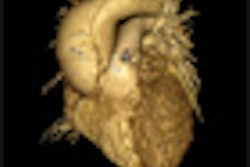Routing screening with echocardiography can find three times as many cases of rheumatic heart disease (RHD) compared to clinical evaluation, according to a study published in Circulation.
In a trial involving the screening of 5,000 school-aged children in Uganda, cardiologists from Children's National Medical Center in Washington, DC, found that 130 had abnormal echocardiograms. Further evaluation at a hospital led to 72 children being classified as having RHD; only 23 met the diagnosis criteria from clinical evaluation.
Therefore, echocardiography screening led to a 400% increase in RHD detection, according to the team led by Dr. Andrea Beaton. The team performed more than 250 screenings a day during the study.
The authors recommended that screening be focused on 10-year-old children in lower socioeconomic groups to maximize limited resources. They also suggested that a two-stage approach be used to detect RHD, comprising initial echocardiography screening followed by comprehensive follow-up. In addition, global efforts to treat subclinical RHD should continue to be supported.



















